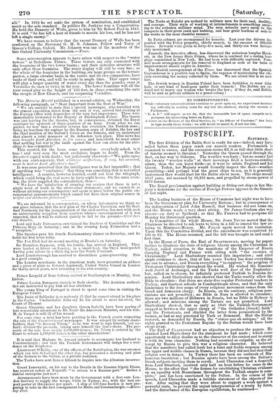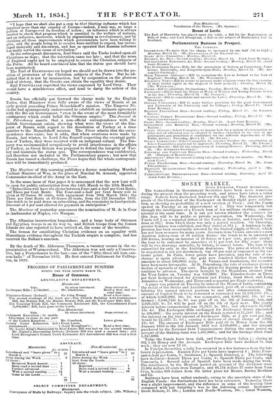The leading business of the House of Commons last night
was to have been the Government plan for University Reform ; but in consequence of the indisposition of Lord John Russell, that business did not come on, and the House made a very short sitting. Sir James Graham also was absent—on duty at Spithead ; so that Mr. FRENCH had to postpone till Monday his threatened question. In Committee of the whole House, Sir Jona Vona° moved that the Chairman be directed to ask leave to bring in a bill to amend the law re- lating to Ministers-Money. Mr. FAGAN again moved his resolution. Upon this the Committee divided, and the amendment was negatived by 136 to 93. The House resumed, and the bill was brought in and read a first time.
In the House of Peers, the Earl of SHAFTESBURY, moving for papers further to illustrate the state of religious liberty among the Christians in Turkey, called attention to the manifesto of the Emperor of Russia charging England and France with siding with "the enemies of Christianity." Lord Shaftesbury resented this imputation ; and cited ample evidence to show, that of late years Turkey has done everything she can to advance, and Russia everything " to suppress " the progress of Protestant Christianity throughout the world. He wished the Russians well North of Archangel, and the Turks well East of the Euphrates ; but, called on to choose, he infinitely preferred Turkish to Russian do- minion. Lord Shaftesbury also showed that the Turks readily allow the Bible to circulate ; that there are sixty-five regular Protestant teachers in Turkey, and fourteen schools in Constantinople alone, and that the only hinderance to the free scope of every religious movement comes from the Greek and Armenian clergy. In Russia, on the contrary, religious asso- ciations are not permitted ; no Bible in Russ is allowed to circulate ; there are two millions of Hebrews in Russia, but no Bible in Hebrew is allowed ; and missions among the Tartars are not permitted, Lord Shaftesbury showed, that as early as 1846 the Turkish Government stepped in between the upper clergy of "the Orthodox [Greek] faith" and the Protestants, and shielded the latter from persecutions by the former, as bad as any practised by Turk or Romanist. Had the Sultan restored, as demanded by Russia, the "status quo ab antique," all the rights granted to the Protestant Rayahs by the Sultan would have been swept away. The Earl of CLARENDON had no objection to produce the papers. He thanked Lord Shaftesbury for the statement he had made ; which came opportunely to allay doubts as to the character of the contest and to stamp it with its true character. Nothing had occurred so culpable as the at- tempt by Russia to give this war a religious character. He believed that the manifesto had called forth but a faint and feeble response among the upper and middle classes in Russia, because they did not feel that their religion was in danger. In Turkey there has been no outbreak of Ma- hometan fanaticism ; but Russian agents have been among the Sultan's Greek subjects inciting them to revolt. Lord Clarendon read a despatch from Lord Stratford, received only half an hour before he came to the House, to the effect that " the finnan for establishing Christian evidence on an equality with Mussulman throughout the Turkish empire is com- plete," and has been sanctioned by the Sultan. In the course of his speech, Lord Clarendon made a forcible statement of the objects of the war. After saying that they were about to support a weak against a powerful state, to prevent the unjust interpretation of a treaty by force, and the disturbance of the European equilibrium, he Continued- "I hope that we shall also put a stop to that blasting influence which has deprived more than one country of Europe-indeed, I may say, so large a portion of Europe-of its freedom of action ; an influence which is always exerted to check that progress which is essential to the welfare of nations, and an influence, moreover, which by stigmatizing as revolutionary, and by checking all those improvements which governments have been willing to give, and the people being fit to receive were entitled to expect, has encou- raged disloyalty and discontent, and has so operated that Russian influence has really served the cause of revolution." In the subsequent discussion, Earl GREY said the Turks looked upon all Christians as dogs-; that the toleration came too late ; and that the arms of England ought not to be employed to coerce the Christian subjects of the Porte. All he heard convinced him that the status quo should have been maintained.
The Earl of ELLMTBOROUGH hoped we should not be drawn into the po- sition of protectors of the Christian subjects of the Porte. But he ad- mitted that it is not by insurrection, but by cooperation on the glorious field of victory, that the Greeks can obtain the equality they desire. Earl Frrzwaidasi regretted the views expressed by Lord Grey. They would have a mischievous effect, and tend to damp the ardour of the country.



























 Previous page
Previous page